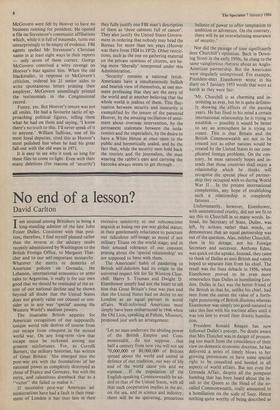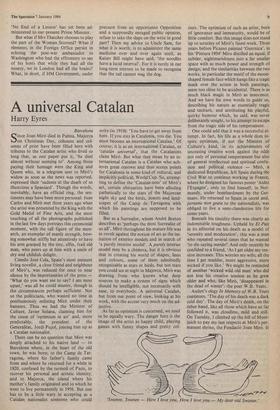No end of a lesson?
David Carlton
Iam unusual among Britishers in being a long-standing admirer of the late John Foster Dulles. Consistent with that posi- tion, therefore, I find myself pleased rather than the reverse at the salutary snubs recently administered by Washington to the British Foreign Office, to Margaret That- cher and to our self-important monarchy. Whatever the merits or demerits of American policies on Grenada, the Lebanon, international economics or arms sales to Argentina, it really is for our own good that we should be reminded of the ex- tent of our national decline and be shown beyond all doubt that the United States does not greatly value our counsel or con- sider us in any way 'special' among the Western World's medium powers.
The insatiable British appetite for American recognition of our supposedly unique world role derives of course from our escape from conquest in the second world war. On any long-term view that escape must be reckoned among our greatest misfortunes. For, as Correlli Barnett, the military historian, has written of Great Britain: 'She emerged into the post-war era with the foundations of her national power as completely destroyed as those of France and Germany, but with the extra, and calamitous drawback that as a "victor" she failed to realise it.'
If successive post-war American ad- ministrations have had a fault in their treat- ment of London it has thus lain in their excessive sensitivity to our subconscious anguish at losing our pre-war global status; in their gentlemanly reluctance to puncture our ridiculous self-image as moral if not military Titans on the world stage; and in their amused tolerance of our constant prating about the 'special relationship' we are supposed to have with them.
The Americans' habit of pandering to British self-delusion had its origin in the universal respect felt for Sir Winston Chur- chill. Harry S. Truman and Dwight D. Eisenhower simply had not the heart to tell him that Great Britain's time was past and that the United States had no desire to see London as an equal partner in world affairs. Well-informed Americans must simply have been embarrassed in 1946 when the Old Lion, speaking at Fulton, Missouri, proposed just such an arrangement: `Let no man underrate the abiding power of the British Empire and Com- monwealth... do not suppose... that half a century from now you will not see 70,000,000 or 80,000,000 of Britons spread about the world and united in defence of our tradition, our way of life and of the world cause you and we espouse... If the population of the English-speaking Commonwealth be ad- ded to that of the United States, with all that such cooperation implies in the air, on the sea, and in science and industry, there will be no quivering, precarious balance of power to offer temptation to ambition or adventure. On the contrary, there will be an overwhelming assurance of security.'
Nor did the passage of time significantly dent Churchill's optimism. Back in Down- ing Street in the early 1950s, he clung to the same vainglorious rhetoric about an Anglo- American partnership. But the Americans were singularly unimpressed. For example, President-elect Eisenhower wrote in his diary on 5 January 1953 words that were as harsh as they were fair: `Mr. Churchill is as charming and in- teresting as ever, but he is quite definite- ly showing the effects of the passing years. He has fixed in his mind a certain international relationship he is trying to establish — possibly it would be better to say an atmosphere he is trying to create. This is that Britain and the British Commonwealth are not to be treated just as other nations would be treated by the United States in our com- plicated foreign problems. On the con- trary, he most earnestly hopes and in- tends that those countries shall enjoy a relationship which he thinks will recognise the special place of partner- ship they occupied with us during World War II... In the present international complexities, any hope of establishing such a relationship is completely fatuous...'
Unfortunately, however, Eisenhower, with unintentional cruelty, did not see fit to say this to Churchill in so many words. In- stead, his Secretary of State, Dulles, was left, by actions rather than words, to demonstrate that an equal partnership was out of the question. Alas, neither Churchill, then in his dotage, nor his Foreign Secretary and successor, Anthony Eden, was quick on the uptake. Instead, they came to think of Dulles as anti-British and vainly hoped to separate him from his chief. The result was the Suez debacle in 1956, when Eisenhower proved to be even more remorseless than Dulles in humiliating Lon- don. Dulles in fact was the better friend of the British in that he, unlike his chief, had seen from the outset the value of a forth- right puncturing of British illusions whereas Eisenhower was simply too good-natured to take this line with his wartime allies until it was too late to avoid their drastic humilia- tion.
President Ronald Reagan has now followed Dulles's precept. No doubt aware that Mrs Thatcher was in danger of presum- ing too much from the coincidence of their view on domestic economic doctrine, he has delivered a series of timely blows to her growing pretensions to have some special right to be consulted and heeded in all aspects of world affairs. But not even the Grenada Affair, despite all the pompous humbug that has been heard about the in- sult to the Queen as the Head of the so- called Commonwealth, really amounted to a humiliation on the scale of Suez. Hence nothing quite worthy of being described as
`No End of a Lesson' has yet been ad- ministered to our present Prime Minister.
But what if Mrs Thatcher chooses to play the part of the Woman Scorned? What if elements in the Foreign Office persist in echoing the post-war ambassador to Washington who had the effrontery to say of his hosts that while they had all the money, we in London had all the brains? What, in short, if HM Government, under pressure from an opportunist Opposition and a supposedly enraged public opinion, refuse to take the slaps on the wrist in good part? Then my advice to Uncle Sam, for what it is worth, is to administer the same medicine over and over again until, as Kaiser Bill might have said, 'the noodles have a lucid interval'. For it is surely in our long-term interest to be made to recognise that the tail cannot wag the dog.



































 Previous page
Previous page